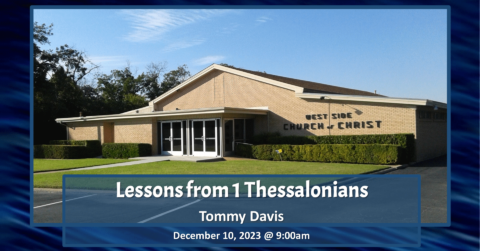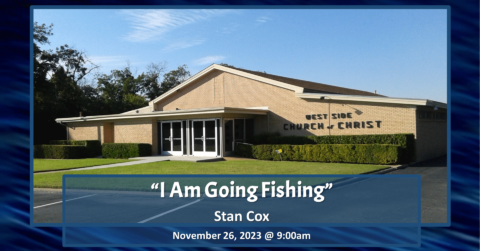Category: Christian Living
Subject: Christian Living
Not That I Have Already Attained

One simple passage that shows the error of the Calvinistic doctrine of the Perseverance of the Saints, and speaks to the need for continued diligence is Philippians 3:12. “Not that I have already attained, or am already perfected; but I press on, that I may lay hold of that for which Christ Jesus has also laid hold of me.”
Of any Christian in the first century who had the right (if it existed) to state he was guaranteed a place in heaven for what had already been done, it was Paul. He was both saved by the Grace of God, and amply demonstrated his faith in the “finished work of Jesus Christ.” However, he did not conduct himself as one whose fate was guaranteed, but as one who had to “remain faithful until death” (cf. Revelation 2:10).
Notice the next two verses, (13-14), “Brethren, I do not count myself to have apprehended; but one thing I do, forgetting those things which are behind and reaching forward to those things which are ahead, I press toward the goal for the prize of the upward call of God in Christ Jesus.”
We, like Paul, must live our lives with the same point of view. “Not that I have already attained”… “I do not count myself to have apprehended.” We must “press toward the goal for the prize of the upward call of God in Christ Jesus.”
We wouldn’t want to miss out on the crown that God has promised to the faithful! (cf. 2 Timothy 4:6-8).
Sermon: Lessons from 1 Thessalonians

In this lesson, speaker Tommy Davis surveys 1 Thessalonians, pointing out and commenting on some of the lessons Paul taught to this faithful and dedicate group.
“I Am Going Fishing”

Why in John 21 did Peter say, “I am going fishing”? We don’t know for sure, but we do know he was grieved for betraying Jesus on the night of his death. And, we know when he helped to establish the kingdom he remained faithful unto death.
Current Culture and the Christian

There is great interest about how Christians should react to, and interact with our present culture. A few observations will help to introduces our subject. First, faith in Jesus Christ has always, is now, and will ever run counter to the cultural views of the world. That is why the Bible speaks of God’s people in exclusionary terms. For example, “These all died in faith, not having received the promises, but having seen them afar off were assured of them, embraced them and confessed that they were strangers and pilgrims on the earth. For those who say such things declare plainly that they seek a homeland. And truly if they had called to mind that country from which they had come out, they would have had opportunity to return. But now they desire a better, that is, a heavenly country. Therefore God is not ashamed to be called their God, for He has prepared a city for them” (Hebrews 11:13-16). The Hebrew writer’s designation of these heroes of faith as “strangers and pilgrims” is intended to be an exhortation to Christians to have the same relationship to the world. We are not to fit in. Our views, convictions and standards should not align to the world. Continue reading “Current Culture and the Christian” →
Fall Meeting 2023 (Wayne Fancher)
Below are the 9 lessons, both audio and video, that Wayne Fancher preached for the West Side congregation from November 4-9, 2023. We commend them to you.
11/4 (Saturday Night)
Continual Reorientation in An Ever Changing World
11/5 (9am Sermon, Sunday)
Little By Little
11/5 (10am Class, Sunday)
Lessons from the Parable of the Prodigal Son
11/5 (11am Sermon, Sunday)
How To Fight Sinking When We Are Hit By Sorrow Upon Sorrow
11/6 (Monday Night)
The Different Aspects of Faith
11/7 (Tuesday Night)
God Who Makes the Broken Beautiful
11/8 (Wednesday Class @ 10am)
She Has Done What She Could
11/8 (Wednesday Evening Sermon)
Spiritual Collateral Damage and Blessings
11/9 (Thursday Night)
Soldiers of Christ Arise and Put Your Armor On
“Put that on my account”

In his letter to Philemon, the apostle Paul made an appeal to his brother in Christ about an escaped slave, Onesimus, whom Paul had converted. This was a wonderful thing for Onesimus, but it came as a result of his disobedience and treachery toward Philemon. This short missive is not intended to examine the existence of slavery, nor the fact that the Christian Philemon owned at least one.
There had, though been a change. Once, Onesimus had been “unprofitable to” Philemon, and now Paul wrote was “profitable to you and to me” (11). However, Paul was not willing to defraud his brother. By law, Onesimus belonged to Philemon, and Paul wrote, “But without your consent I wanted to do nothing, that your good deed might not be by compulsion, as it were, but voluntary” (14).
As a means of appealing to Philemon, Paul wrote, “But if he has wronged you or owes anything, put that on my account” (18). This is a true case of going above and beyond based on love for another. It is the action of the Lord Himself, who died not for His own sins, but the sins of you and me.
How about you, are you willing to act in such a sacrificial way? It is one thing to say you are willing to help, but quite another to say, “put that on my account.” Typically, this might be something done for our physical families, but what about our brethren?
Sermon: Exhortations to Philippi

A discussion of Philippians 4:1-9, where the apostle gives some beneficial exhortations to a church he loved.
Sermon Powerpoint View and Download:
<<———><><———>>
The Ax

In Matthew 3 John the Baptist had an interesting way of stating that the last days were upon them. He warned the Pharisees and Sadducees about their complacency and feelings of superiority. When they came to his baptism, he greeted them with the words, “Brood of vipers! Who warned you to flee from the wrath to come?” (3:7). He also preemptively responded to their potential response. “And do not think to say to yourselves, ‘We have Abraham as our father.’ For I say to you that God is able to raise up children to Abraham from these stones” (3:9).
What these Jewish leaders thought is that in their position as God’s chosen people, they would always have standing and protection. However, with the change in covenant in the coming of Jesus, everything is changed! As John stated, “I indeed baptize you with water unto repentance, but He who is coming after me is mightier than I, whose sandals I am not worthy to carry” (3:11). This coming One’s work is described, “His winnowing fan is in His hand, and He will thoroughly clean out His threshing floor, and gather His wheat into the barn; but He will burn up the chaff with unquenchable fire” (3:12).
When would it happen? Soon! John was preparing the way. Note his words: “And even now the ax is laid to the root of the trees. Therefore every tree which does not bear fruit is cut down and thrown into the fire” (3:10). Today, the only protection we have is faithfulness, not position. So, bear fruit for the Lord, and avoid the ax!
What Grace Teaches Us!

The apostle Paul wrote to Titus, explaining that God’s grace has something to teach us. Let us read the text, and then make some points:
“For the grace of God that brings salvation has appeared to all men, teaching us that, denying ungodliness and worldly lusts, we should live soberly, righteously, and godly in the present age, looking for the blessed hope and glorious appearing of our great God and Savior Jesus Christ, who gave Himself for us, that He might redeem us from every lawless deed and purify for Himself His own special people, zealous for good works” (Titus 2:11-14).
First, we need to understand how grace teaches. It is simple, the gift of grace is great. It is great in its benefits. God’s gift of His Son as our Redeemer affords us a hope of eternal life! It is great in its sacrifice. God’s giving of His Son was a great sacrifice in that Jesus was the only begotten of the Father, and God loved His Son. It is great in what it reveals to us about God. He loves us! He gave us everything we need to deal with our sin. He wants every living soul to go to heaven, and so has gifted us with grace, so that we can obtain what we ourselves could not possibly receive on our own merit. So, the gift of grace impresses the thoughtful because of its significance, sacrifice and its absolute necessity for our redemption. Continue reading “What Grace Teaches Us!” →
Mining the Scriptures: Jude 20-23
 Though Jude’s primary purpose was to warn about false teacher’s, he also writes several words of instruction to his readers. In fact, verses 20-23 contain such, beginning with the phrase “But you…” As such these have application in our lives as well.
Though Jude’s primary purpose was to warn about false teacher’s, he also writes several words of instruction to his readers. In fact, verses 20-23 contain such, beginning with the phrase “But you…” As such these have application in our lives as well.
Build your faith (through an examination and cultivation of God’s word. We are to constantly be improving in our Christian walk). Pray in the Holy Spirit (this most probably indicates that we are to pray in accord with God’s will, that which the Holy Spirit has shared through His inspiration of the word). Keep yourselves in the love of God (this is our responsibility, to keep ourselves in God’s love. Obedience is how we show our devotion and love for Him). Look for Christ’s mercy (as Cornelius and other seeker’s of truth have done).
Finally, verses 22-23 explain how we are to deal with the sins of others. This depends upon the circumstances of the sin and sinner, how fully they are taken in the sin, and what is best to save them. Some need longsuffering and compassion, while others need a more direct and hasty treatment, “pulling them out of the fire” (23).
Three Qualities of Those Faithful to God

The qualities of godliness, righteousness and holiness characterize and identify those who please God.
The Old Man VS The New Man
 What does God intend the Christian to be? As indicated in Colossians 3:9-10, we are to put off the old man and put on the new man. The way this is done is described in Romans 6:1-4. It is the process of conversion. But, the two are described in our text of Colossians 3:1-17
What does God intend the Christian to be? As indicated in Colossians 3:9-10, we are to put off the old man and put on the new man. The way this is done is described in Romans 6:1-4. It is the process of conversion. But, the two are described in our text of Colossians 3:1-17
So, what is this old man we put off? Consider the following, expressed in Colossians 3:5-9, “Therefore put to death your members which are on the earth: fornication, uncleanness, passion, evil desire, and covetousness, which is idolatry. Because of these things the wrath of God is coming upon the sons of disobedience, in which you yourselves once walked when you lived in them. But now you yourselves are to put off all these: anger, wrath, malice, blasphemy, filthy language out of your mouth. Do not lie to one another, since you have put off the old man with his deeds.”
The new man who is renewed in knowledge according to the image of Christ is described in verses 12-17, “Therefore, as the elect of God, holy and beloved, put on tender mercies, kindness, humility, meekness, longsuffering; bearing with one another, and forgiving one another, if anyone has a complaint against another; even as Christ forgave you, so you also must do. But above all these things put on love, which is the bond of perfection. And let the peace of God rule in your hearts, to which also you were called in one body; and be thankful. Let the word of Christ dwell in you richly in all wisdom, teaching and admonishing one another in psalms and hymns and spiritual songs, singing with grace in your hearts to the Lord. And whatever you do in word or deed, do all in the name of the Lord Jesus, giving thanks to God the Father through Him.” Amen.
Mining the Scriptures: Titus 2:1-10

It is important to note that here Paul is giving Titus instructions on what to teach. It is important to declare the “whole counsel of God”, (cf. Acts 20:27). An aspect of that declaration is to teach every person, young or old, male or female, how they should direct their lives.
There are specific admonitions that different ages or genders need. This is not sexist or ageist, it is merely an acknowledgment of the order of life, and what God always requires of us. With this in mind, the text is a treasure trove of good instruction.
Older men are to be characterized by sobriety and reverence. The old women as well, and they are to teach the younger women with less experience. The younger women are to show love, deference and care to their husbands and children. The younger men are to be act with maturity. They are to have integrity and soundness in action.
Finally, bondservants are to serve their masters with fidelity as Christians should always do. The exhortations are simple, but needed. As too often they are ignored.
Sermon: Cannot See Afar Off

The list of 2 Peter 1 is described, and the consequences of not adding the attributes are discussed.
Sermon Powerpoint View and Download:
<<———><><———>>




